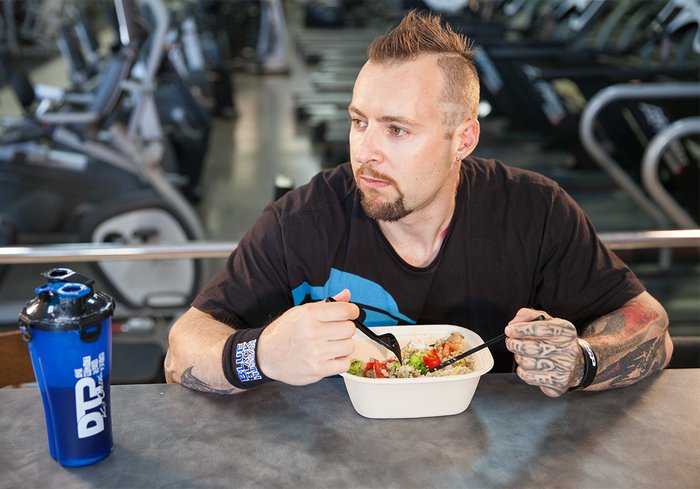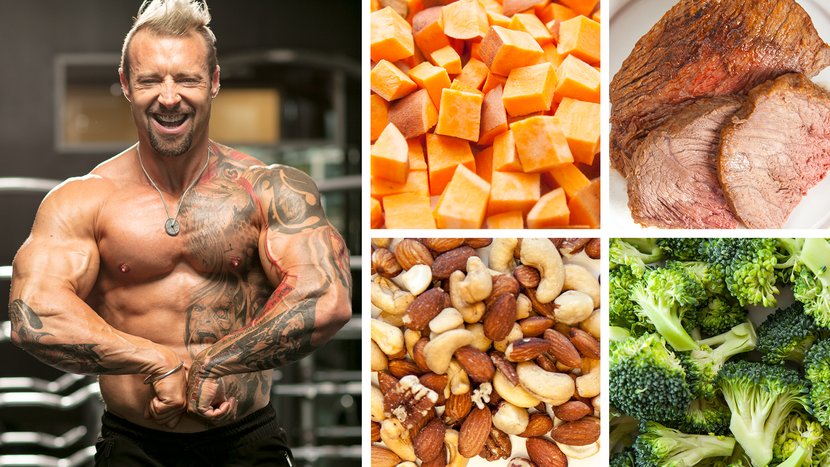Eating for growth isn't as simple as strapping on a feedbag and doing another set of curls and squats. Be systematic, and you'll be successful! Here's your plan.
It often feels like everybody wants to build muscle, but nobody wants to be systematic about how they do it. Adding lean mass isn't about cutting loose in either training or eating; in both cases, the more you plan for success, the more you'll succeed.
To help you avoid wasting any valuable time, I've collated my most successful nutrition and supplementation plan for building muscle. This same approach has helped millions of people around the world develop muscle fast, while minimizing unwanted fat gain. Does that sound like what you're looking for? Pretty sure it does.
Building muscle is all about quality over quantity. On this plan you'll be eating enough calories to maintain a marginal surplus. There is no "free for all" on processed junk food because you want to gain weight—that'll just lead to becoming fat! Get ready, get prepared, and get growing.
Training Day Nutrition
On training days where you'll be exposed to seriously intense workouts—like the kind in my popular growth plans The 12-Week Muscle-Building Trainer or DTP: 4 Weeks to Maximum Muscle—you'll require more carbohydrates. Carbs are what feed your muscles the performance-enhancing fuel they need to power through crazy volume. Carbohydrates are also protein sparing, meaning that they'll keep your body from breaking down muscle tissue for fuel. This is why they account for half of your daily calorie intake.

Training day macro breakdown:
- 30 percent protein
- 20 percent fat
- 50 percent carbohydrates
Non-Training Day Nutrition
There is less need for immediate fuel on rest days, which is why your carbohydrates are lower. Protein is increased because the protein-sparing effect on carbohydrates is obviously going to be reduced. Higher fat intake is crucial on rest days because fat supports hormonal production, a vital part of muscle recovery and growth.
Non-Training day macro breakdown:
- 40 percent protein
- 30 percent fat
- 30 percent carbohydrates
Building Your Meals
Small and frequent meals are the template you're going to follow, eating six meals during the day. Spreading your protein intake out equally across several meals, rather than just cramming most of it into just a couple of meals, has been shown to enhance muscle growth.[1] But clearly, you need to work out what your macros are for each meal.
Populate the calorie calculator to discover how many calories each day you need to eat. From that, divide the total calorie count by the percentage of each macro group I've given you so it tallies.
Remember the differences for training and non-training days, this is essential. If you're a particularly hard gainer, it might be worth adding an additional 100-500 calories per day via carbohydrates on training days. This only goes for anybody who's lean and has found gaining weight difficult all his or her life!

Below is a list of foods you're allowed to use to build your meals. Don't veer too far from this list; You need clean, healthy food which nourishes your body. There's no room for inferior "cheat food" here.
Protein
- Beef
- Elk
- Buffalo
- Chicken
- Turkey
- Fish
- Eggs
- Egg whites
- Cottage cheese
- Tofu
- Natural yogurt
- Re-Kaged protein
- Kasein protein
Fats
- Nuts
- Peanut butter
- Almond butter
- Avocado
- Eggs
- Coconut oil
- Fish
- Red meat
Carbohydrates
- Wholegrain rice
- Potatoes
- Sweet potatoes
- Yams
- Quinoa
- Oatmeal
Vegetables
- Broccoli
- Cabbage
- Spinach
- Asparagus
- Other leafy, green vegetables
Go ahead and build your meals using the foods above, provided they meet the daily macro requirements given and they're consumed across six meals, approximately every three hours.
Progressing Your Diet
Progression is the name of the game, so as you add muscle mass, you're going to have to adjust your diet. This is a good thing! As you build muscle, your calorie requirements change because there is more muscle to support.
When you're following an intense growth protocol, each week add an extra 100 calories per day to your diet. On training days, use carbohydrates to achieve this. On non-training days, use fats. Every fourth week, repopulate your personal data into the calculator provided above. That will keep your diet aligned with your latest requirements.
Summary
If you follow this plan faithfully without deviations, using my guidance to adjust the diet as you progress, I'm certain you will make great gains! Nothing is more important than the other, they are all equal: 100 percent diet, 100 percent training, and 100 percent supplementation. Take that mindset, and you can't go wrong.














Post A Comment:
0 comments: